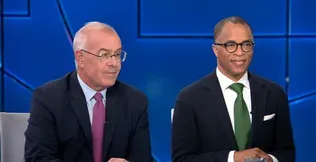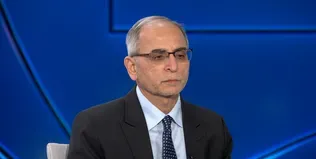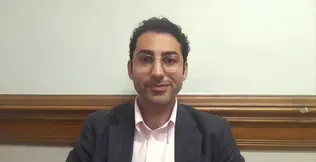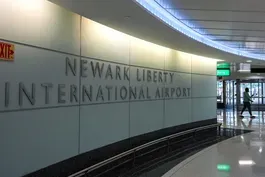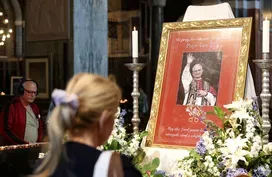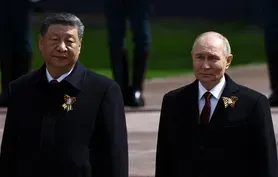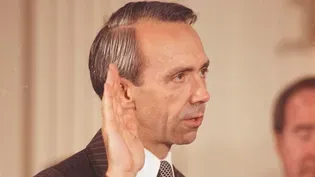
Miller suggests suspending habeas corpus to deport migrants
Clip: 5/9/2025 | 3m 55sVideo has Closed Captions
Top Trump adviser suggests White House could suspend habeas corpus to deport migrants
The Trump administration again escalated its fight with the judiciary. In stunning remarks, White House Deputy Chief of Staff Stephen Miller said they are considering suspending habeas corpus for migrants contesting detentions. Miller’s comments come as judges across the country have blocked major parts of President Trump’s immigration agenda. Laura Barrón-López reports.
Problems with Closed Captions? Closed Captioning Feedback
Problems with Closed Captions? Closed Captioning Feedback
Major corporate funding for the PBS News Hour is provided by BDO, BNSF, Consumer Cellular, American Cruise Lines, and Raymond James. Funding for the PBS NewsHour Weekend is provided by...

Miller suggests suspending habeas corpus to deport migrants
Clip: 5/9/2025 | 3m 55sVideo has Closed Captions
The Trump administration again escalated its fight with the judiciary. In stunning remarks, White House Deputy Chief of Staff Stephen Miller said they are considering suspending habeas corpus for migrants contesting detentions. Miller’s comments come as judges across the country have blocked major parts of President Trump’s immigration agenda. Laura Barrón-López reports.
Problems with Closed Captions? Closed Captioning Feedback
How to Watch PBS News Hour
PBS News Hour is available to stream on pbs.org and the free PBS App, available on iPhone, Apple TV, Android TV, Android smartphones, Amazon Fire TV, Amazon Fire Tablet, Roku, Samsung Smart TV, and Vizio.
Providing Support for PBS.org
Learn Moreabout PBS online sponsorshipGEOFF BENNETT: Today, the Trump administration again escalated its fight with the courts.
In stunning remarks to reporters this afternoon, White House Deputy Chief of Staff Stephen Miller said the administration is considering suspending habeas corpus.
Habeas petitions give people the right to contest unlawful detentions.
STEPHEN MILLER, White House Deputy Chief of Staff: Well, the Constitution is clear -- and that, of course, is the supreme law of the land -- that the privilege of threat e writ of habeas corpus can be suspended in a time of invasion.
So, it's an option we're actively looking at.
Look, a lot of it depends on whether the courts do the right thing or not.
The courts aren't just at war with the executive branch.
The courts are at war with -- these radical rogue judges with the legislative branch as well too.
GEOFF BENNETT: Miller's comments come as judges across the country have blocked major parts of President Trump's immigration agenda, including ordering that some students being targeted for deportation by the administration be released from detention.
Our White House correspondent, Laura Barron-Lopez, joins us now for the latest.
So, Laura, can the president do this, as Miller is suggesting?
LAURA BARRON-LOPEZ: So habeas is the most basic entitlement to judicial review of unlawful detention, as you noted, Geoff.
And, essentially -- I spoke to Steve Vladeck, the constitutional law scholar, who said that habeas is so fundamental that it is a right that is in the original Constitution under Article I, and that the overwhelming consensus is that it's long been that only Congress can suspend habeas corpus.
The only other time that a president has essentially done this is when it appears as though Congress is not in session.
President Lincoln did this when Congress was not in session at the beginning of the Civil War, but then Congress later authorized the ability to suspend habeas.
Another constitutional law expert I spoke to said that this is significant because, without habeas, there's no way for a person to go before a court and to essentially argue that their liberty was taken away and have a hearing to argue that.
Now, the timing of Stephen Miller's comments is key here because of the fact that it's after a judge -- judges have repeatedly ruled that the administration's actions regarding deportations are unlawful.
And it also comes after a student just today was ordered released by a federal judge from detention after filing a successful habeas petition.
GEOFF BENNETT: And that was the federal judge in Vermont who ordered that Tuft student Rumeysa Ozturk, who was being detained in Louisiana, is that right, that she must be released?
LAURA BARRON-LOPEZ: That's right.
GEOFF BENNETT: Bring us up to speed.
LAURA BARRON-LOPEZ: That's right.
So, Rumeysa Ozturk is a Ph.D. student from Tufts who was not charged with a crime.
Her student visa was revoked and she's been in detention since March because of an op-ed that she wrote that was critical of Israel that the administration said is evidence that she poses a foreign policy - - an adverse foreign policy consequence.
And the judge today, District Judge William Sessions, said that the government's case was entirely based on this op-ed that Ozturk wrote, that essentially there was no evidence that she has engaged in violence or advocated violence to back up their claims that she poses a threat to U.S. foreign policy.
They said she does -- the judge said that she does not pose a flight risk and so he placed no travel restrictions on her.
He called her health - - she suffers from asthma and she even had an asthma attack during the hearing today.
He called her health in extraordinary circumstance and said that her further detention could potentially pose dangerous -- a danger to her health.
And this is one significant line that the judge as well said, Judge William Sessions said, that: "Her continued detention potentially chills the speech of the millions and millions of individuals in this country who are not citizens."
And I just want to say also, Geoff, that she was initially detained not far from her home.
She was arrested by plainclothes agents off the streets of Boston and.
When that video was released, it was pretty stunning to see.
GEOFF BENNETT: Yes, we're looking at that video right now.
Brooks and Capehart on Pope Leo's impact on U.S. politics
Video has Closed Captions
Clip: 5/9/2025 | 10m 44s | Brooks and Capehart on Pope Leo XIV's potential impact on U.S. culture and politics (10m 44s)
India's U.S. ambassador on escalating conflict with Pakistan
Video has Closed Captions
Clip: 5/9/2025 | 7m 11s | India's U.S. ambassador discusses the escalating conflict with Pakistan (7m 11s)
Mohsen Mahdawi says release shows democracy is functioning
Video has Closed Captions
Clip: 5/9/2025 | 8m 5s | 'This is a light of hope': Mohsen Mahdawi says release shows democracy is functioning (8m 5s)
News Wrap: Newark airport suffers another radar outage
Video has Closed Captions
Clip: 5/9/2025 | 4m 47s | News Wrap: Newark airport suffers another radar outage (4m 47s)
Pope Leo's longtime friend on what to expect from his papacy
Video has Closed Captions
Clip: 5/9/2025 | 6m 48s | Pope Leo XIV's longtime friend shares insights on what to expect from his papacy (6m 48s)
Putin uses WWII celebration to strengthen ties with China
Video has Closed Captions
Clip: 5/9/2025 | 5m 23s | Putin uses Russia’s WWII celebration to strengthen alliance with China (5m 23s)
Remembering David Souter and his Supreme Court legacy
Video has Closed Captions
Clip: 5/9/2025 | 4m 20s | Remembering Justice David Souter and his Supreme Court legacy (4m 20s)
Providing Support for PBS.org
Learn Moreabout PBS online sponsorshipSupport for PBS provided by:
Major corporate funding for the PBS News Hour is provided by BDO, BNSF, Consumer Cellular, American Cruise Lines, and Raymond James. Funding for the PBS NewsHour Weekend is provided by...
